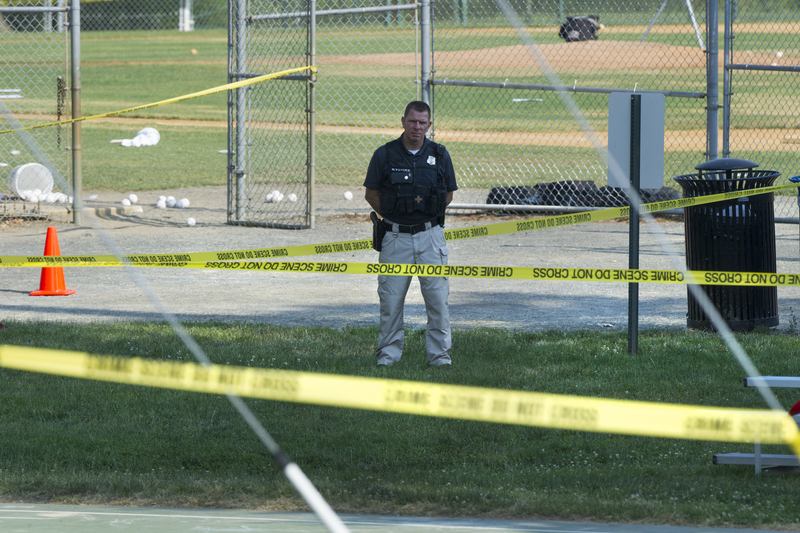BROOKE GLADSTONE: From WNYC in New York, this is On the Media. I’m Brooke Gladstone.
BOB GARFIELD: And I’m Bob Garfield. Another week, another spasm of violence, this time on a Virginia baseball field.
[CLIP]:
MALE CORRESPONDENT: The third most powerful Republican in the House, the majority whip, Steve Scalise, and four others shot, injured and hospitalized.
[END CLIP]
BOB GARFIELD: House Republicans were practicing for a friendly summer showdown with the Democrats, when America's pastime was suddenly desecrated by America's other pastime.
[SOUND OF SHOTS/UP & UNDER]
The latest active shooter, from all indications, was also a politically-active shooter, a left-wing protester enraged at Donald Trump and the GOP, taking a perverted sense of justice into his own hands, whereupon the police, the media, political leaders and polemical partisans responded, as if by reflex, with the all-too-familiar combination of confusion, bravery, compassion, prejudgment, accusation and hysteria. As we have long observed, chaotic breaking-news coverage often obscures the very events it seeks so breathlessly to illuminate. When the mayhem springs from politics, truth and context get more elusive, still. And so, regrettably, we are obliged to offer our latest “Breaking News Consumer Handbook: Political Violence Edition.”
[CLIPS]:
REP. RODNEY DAVIS: This could be the first political rhetorical terrorist act, and that has to stop.
RAND PAUL: I think it was politically motivated and I think we’ll probably find either a mental illness component or some kind of psychological disorder.
MAN: - a strange Facebook post. It’s almost like something out of Lee Harvey Oswald, in a way, someone that was getting ready to do some type of assassination.
[END CLIP]
BOB GARFIELD: Point 1: Be cautious of labels. Terrorism, assassination, hate crime and lunacy are neither precise terms nor mutually exclusive. Each episode is distinct unto itself, and the impulse to label it is more apt to distort the underlying truth than to clarify it. Point 2: Be aware of the political context, in this case, apparently, hyper-partisanship and outrage about Trump’s America, but be wary of assigning responsibility to a cohort of which the killer was but one member. Iowa Republican Steve King blamed the left for Wednesday’s shooting, and he wasn’t alone.
[CLIPS]:
REP. CHRIS COLLINS: - can only hope that the Democrats do tone down the rhetoric. The rhetoric has been outrageous, the finger-pointing, the tone and the anger directed at Donald Trump, his supporters.
BOB GARFIELD: That was Republican Congressman Chris Collins of New York. Here’s former House speaker and presidential candidate Newt Gingrich on FOX News.
NEWT GINGRICH: You’ve had a series of things which send signals that tell people that it's okay to hate Trump, it’s okay to think of Trump in violent terms and it's okay to consider assassinating Trump, and then suddenly we’re supposed to rise above it, until the next time?
BOB GARFIELD: Remember that correlation is not causation and even incendiary political rhetoric is not necessarily incitement. There’s also the “Physician heal thyself” factor. This week's accusations ignore the fact that the vandalism, violence and hate crime of the Trump era has been perpetrated predominantly by those aligned with the political right. In that vein, point 3: Be alert for political opportunism. Keep your hypocrisy and lie detectors switched on. For instance, conspiracy nut Alex Jones tweeted that, quote, “CNN just endorsed #GOPShooting terrorist attack!.” Said shooter, quote, “was not evil.” [SIGHS] What CNN actually aired was the statement of one of the dead shooter's friends endorsing that opinion in no way, shape or form.
Another Twitter meme sprang from a March FOX News headline, wildly mischaracterizing a call to political action from Obama Attorney General Loretta Lynch, misquote, “we need more marching, blood, death on the streets.” In fact, Lynch had been invoking the history of civil rights protest and those martyred in the struggle.
[CLIP]:
LORETTA LYNCH: And it has been people, individuals who have banded together, ordinary people who simply saw what needed to be done and came together and supported those ideals who have made the difference. They’ve marched, they’ve bled, yes, some of them have died. This is hard. Every good thing is. We have done this before. We can do this again.
[END CLIP]
BOB GARFIELD: Point 4: “Thoughts and prayers” sentiments are perfunctory and have long since lost any meaning. Here was President Trump on Wednesday morning.
[CLIPS]:
PRESIDENT DONALD TRUMP: America is praying for you and America is praying for all of the victims of this terrible shooting.
BOB GARFIELD: And House Minority Leader Nancy Pelosi.
HOUSE MINORITY LEADER NANCY PELOSI: We send our thoughts and prayers to our colleague, Steve Scalise.
[END CLIP]
BOB GARFIELD: Compassion boilerplate does nothing to make sense of the tragic event. As such, point number 5: Pay as close attention to what politicians do not say as to what they do say. Did Pelosi draw a distinction between righteous resistance and mindless violence? Did she call attention to the killer’s semiautomatic weapons or his history of domestic violence? These may or may not have been salient or appropriate observations in the moment but it's worth mulling over why she demurred.
Likewise, her opposite number in the House, Speaker Paul Ryan, who might have played to his GOP base but notably did not.
[CLIP]:
HOUSE SPEAKER PAUL RYAN: We are united. We are united in our shock, we are united in our anguish. An attack on one of us is an attack on all of us.
[APPLAUSE/END CLIP]
BOB GARFIELD: Ryan had ample opportunity to point fingers to conflate rabid political attacks on the Republican Party with the murder attempt, to chide, as many in the left have in the wake of right-wing violence, that words have consequences. He chose not to, opting rather to frame the attack as an attack on our democracy. And maybe we should mull that over, as well.


